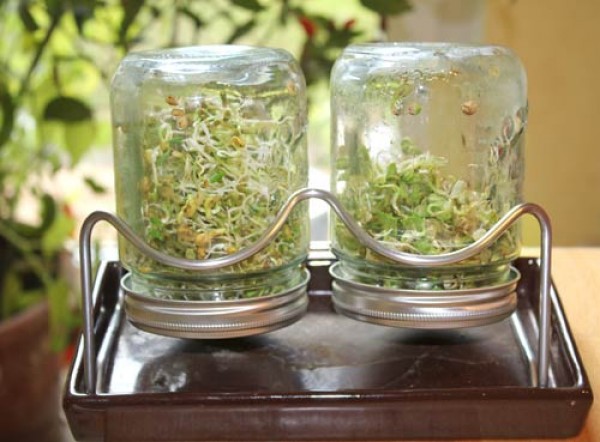
Homegrown Sprouts are considered one of the healthiest foods in the world. They are packed with essential nutrients inn and have numerous health benefits. While sprouts are easily available in grocery stores, many people prefer growing their sprouts at home for freshness and convenience.
Homegrown sprouts not only taste better but are also healthier, as they are not exposed to any harmful chemicals or preservatives. Growing sprouts at home is very easy and requires minimal effort. You can grow a variety of sprouts at home, such as alfalfa, mung beans, lentils, chickpeas, broccoli, radish, and many more.
In this article:
- This article provides insights into the benefits of homegrown sprouts, emphasizing their superior taste and health benefits due to the lack of exposure to harmful chemicals or preservatives that can be common in store-bought versions.
- It guides readers on how to grow a variety of sprouts at home, including but not limited to alfalfa, mung beans, lentils, chickpeas, broccoli, and radish, emphasizing the ease and minimal effort required.
- The article also highlights the importance of sprouts in a healthy diet, driven by the fact that they are packed with essential nutrients and offer numerous health benefits.
Benefits of Homegrown Sprouts
Homegrown sprouts have a higher nutritional value as compared to store-bought ones. This is because they are fresh and not exposed to any harmful chemicals or preservatives. Here are some of the benefits of adding homegrown sprouts to your healthy diet:
- High in Nutrients: Sprouts are rich in vitamins, minerals, and antioxidants. They are also a good source of protein and fiber. Homegrown sprouts contain higher amounts of these nutrients as compared to store-bought ones.
- Improve Digestion: Sprouts are easily digestible and can aid in digestion. They contain enzymes that help break down food and improve nutrient absorption.
- Boost Immunity: Homegrown sprouts are packed with immune-boosting properties. They contain high levels of vitamins A, C, and E which help strengthen the immune system and fight off infections.
- Aid in Weight Loss: Sprouts are low in calories and high in fiber which makes them a great addition to any weight loss diet. They also help keep you full for longer and prevent overeating.
- Anti-inflammatory Properties: Sprouts contain anti-inflammatory properties that can help reduce inflammation in the body. This is beneficial for people suffering from chronic inflammatory conditions such as arthritis, asthma, and heart disease.
How to Grow Homegrown Sprouts
Growing sprouts at home is very easy and requires minimal equipment. Here are the steps to grow homegrown sprouts:
- Choose Your Sprout: You can choose from a variety of sprouts such as alfalfa, mung beans, lentils, chickpeas, broccoli, radish, etc. Make sure to purchase high-quality seeds for the best results.
- Soak the Seeds: Rinse your chosen seeds and soak them in water for 8-12 hours. This will help soften the outer coating and activate the enzymes.
- Prepare a Sprouting Jar: You can use a mason jar or any glass jar with a lid to sprout your seeds. Make sure the jar is clean and dry.
- Drain and Rinse: After soaking, drain the water from the seeds using a strainer. Rinse the seeds thoroughly with clean water and drain again.
- Place the Seeds in the Jar: Transfer the drained seeds to your sprouting jar and spread them evenly.
- Cover and Let it Sprout: Cover the jar with a cloth or mesh lid. This allows airflow while preventing any dirt or insects from getting in. Place the jar in a well-ventilated, warm spot, ideally out of direct sunlight. Your sprouts in a jar will start sprouting in a few days. Make sure to rinse and drain the sprouts at least twice a day to keep them fresh and prevent mold growth. After about 4-7 days, your sprouts should be ready to eat.
- Harvest and Store: Once the sprouts have reached your desired length, rinse them one last time and drain well. You can store them in a sealed container in the refrigerator for up to one week.
Tips for Growing Homegrown Sprouts
- Make sure to use high-quality seeds for best results. Look for organic, non-GMO seeds.
- Rinse and drain the sprouts thoroughly to prevent bacteria growth.
- Make sure the jar is clean and dry before transferring the sprouts to it.
- Use a lid or cover while sprouting to prevent contamination.
Ways to Incorporate Homegrown Sprouts into Your Diet
Homegrown sprouts can be added to a variety of dishes to boost their nutritional value. Here are some ways you can incorporate sprouts into your diet:
- Add them to Salads: Sprouts make a great addition to salads, adding crunch and flavor.
- Use them in Sandwiches and Wraps: Replace lettuce or other greens with sprouts for an extra nutrient boost in your sandwich or wrap.
- Blend them in Smoothies: Add a handful of sprouts to your smoothie for added nutrition without altering the taste.
- Top Your Soups and Curries: Sprouts can be used as a garnish on top of soups and curries for added texture and flavor.
- Make Sprout Stir-Fry: Stir-fry sprouts with other vegetables and protein for a healthy and nutritious meal.
Precautions to Take While Consuming Homegrown Sprouts
While homegrown sprouts have numerous health benefits, there are some precautions that you should take while consuming them:
- Rinse thoroughly: Make sure to rinse your sprouts thoroughly with clean water before consuming them. This will help remove any bacteria or dirt.
- Consume within a week: Homegrown sprouts should be consumed within one week of harvesting as they can spoil quickly.
- Avoid consuming raw sprouts: Cook your sprouts before consuming them to reduce the risk of foodborne illness.
- Store properly: Properly store your sprouts in an airtight container in the refrigerator to prevent bacteria growth.
Conclusion
Homegrown sprouts are a great addition to your healthy diet. They are packed with nutrients, easy to grow at home, and can be added to various dishes for an extra nutritional boost. Make sure to follow proper precautions while consuming sprouts and enjoy their many health benefits! So why wait? Start growing your own sprouts at home today and reap the benefits of these tiny superfoods. Remember, your health is in your hands! Read more






